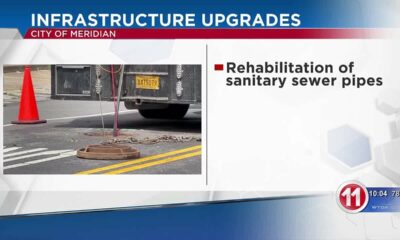Kaiser Health News
Nursing Homes Wield Pandemic Immunity Laws To Duck Wrongful Death Suits
Fred Schulte, KFF Health News
Tue, 14 May 2024 09:00:00 +0000
In early 2020, with reports of covid-19 outbreaks making dire headlines, Trever Schapers worried about her father's safety in a nursing home in Queens.
She had delighted in watching her dad, John Schapers, blow out the candles on his 90th birthday cake that February at the West Lawrence Care Center in the New York City borough. Then the home went into lockdown.
Soon her father was dead. The former union painter spiked a fever and was transferred to a hospital, where he tested positive for covid, his daughter said, and after two weeks on a ventilator, he died in May 2020.
But when Trever Schapers sued the nursing home for negligence and wrongful death in 2022, a judge dismissed the case, citing a New York state law hastily passed early in the pandemic. It granted immunity to medical providers for “harm or damages” from an “act or omission” in treating or arranging care for covid. She is appealing the decision.
“I feel that families are being ignored by judges and courts not recognizing that something needs to be done and changed,” said Schapers, 48, who works in the medical field. “There needs to be accountability.”
The nursing home did not return calls seeking comment. In a court filing, the home argued that Schapers offered no evidence that the home was “grossly negligent” in treating her father.
More than four years after covid first raged through many U.S. nursing homes, hundreds of lawsuits blaming patient deaths on negligent care have been tossed out or languished in the courts amid contentious legal battles.
Even some nursing homes that were shut down by health officials for violating safety standards have claimed immunity against such suits, court records show. And some families that allege homes kept them in the dark about the health of their loved ones, even denying there were cases of covid in the building, have had their cases dismissed.
Schapers alleged in a complaint to state health officials that the nursing home failed to advise her that it had admitted covid-positive patients from a nearby hospital in March 2020. In early April, she received a call telling her the facility had some covid-positive residents.
“The call I received was very alarming, and they refused to answer any of my questions,” she said.
About two weeks later, a social worker called to say that her father had a fever, but the staff did not test him to confirm covid, according to Schapers' complaint.
The industry says federal health officials and lawmakers in most states granted medical providers broad protection from lawsuits for good faith actions during the health emergency. Rachel Reeves, a senior vice president with the American Health Care Association, an industry trade group, called covid “an unprecedented public health crisis brought on by a vicious virus that uniquely targeted our population.”
In scores of lawsuits, however, family members allege that nursing homes failed to secure enough protective gear or tests for staffers or residents, haphazardly mixed covid-positive patients with other residents, failed to follow strict infection control protocols, and brazenly misled frightened families about the severity of covid outbreaks among patients and staff.
“They trusted these facilities to take care of loved ones, and that trust was betrayed,” said Florida attorney Lindsey Gale, who has represented several families suing over covid-related deaths.
“The grieving process people had to go through was horrible,” Gale said.
A Deadly Toll
KFF Health News found that more than 1,100 covid-related lawsuits, most alleging wrongful death or other negligent care, were filed against nursing homes from March 2020 through March of this year.
While there's no full accounting of the outcomes, court filings show that judges have dismissed some suits outright, citing state or federal immunity provisions, while other cases have been settled under confidential terms. And many cases have stalled due to lengthy and costly arguments and appeals to hash out limits, if any, of immunity protection.
In their defense, nursing homes initially cited the federal Public Readiness and Emergency Preparedness Act, which Congress passed in December 2005. The law grants liability protection from claims for deaths or injuries tied to vaccines or “medical countermeasures” taken to prevent or treat a disease during national emergencies.
The PREP Act steps in once the secretary of Health and Human Services declares a “public health emergency,” which happened with covid on March 17, 2020. The emergency order expired on May 11, 2023.
The law carved out an exception for “willful misconduct,” but proving it occurred can be daunting for families — even when nursing homes have long histories of violating safety standards, including infection controls.
Governors of at least 38 states issued covid executive orders, or their legislatures passed laws, granting medical providers at least some degree of immunity, according to one consumer group's tally. Just how much legal protection was intended is at the crux of the skirmishes.
Nursing homes answered many negligence lawsuits by getting them removed from state courts into the federal judicial system and asking for dismissal under the PREP Act.
For the most part, that didn't work because federal judges declined to hear the cases. Some judges ruled that the PREP Act was not intended to shield medical providers from negligence caused by inaction, such as failing to protect patients from the coronavirus. These rulings and appeals sent cases back to state courts, often after long delays that left families in legal limbo.
“These delays have been devastating,” said Jeffrey Guzman, a New York City attorney who represents Schapers and other families. He said the industry has fought “tooth and nail” trying to “fight these people getting their day in court.”
Empire State Epicenter
New York, where covid hit early and hard, is ground zero for court battles over nursing home immunity.
Relatives of residents have filed more than 750 negligence or wrongful death cases in New York counties since the start of the pandemic, according to court data KFF Health News compiled using the judicial reporting service Courthouse News Service. No other area comes close. Chicago's Cook County, a jurisdiction where private lawyers for years have aggressively sued nursing homes alleging poor infection control, recorded 121 covid-related cases.
Plaintiffs in hundreds of New York cases argue that nursing homes knew early in 2020 that covid would pose a deadly threat but largely failed to gird for its impact. Many suits cite inspection reports detailing chronic violations of infection control standards in the years preceding the pandemic, court records show. Responses to this strategy vary.
“Different judges take different views,” said Joseph Ciaccio, a New York lawyer who has filed hundreds of such cases. “It's been very mixed.”
Lawyers for nursing homes counter that most lawsuits rely on vague allegations of wrongdoing and “boilerplate” claims that, even if true, don't demonstrate the kind of gross negligence that would override an immunity claim.
New York lawmakers added another wrinkle by repealing the immunity statute in April 2021 after Attorney General Letitia James noted the law could give nursing homes a free pass to make “financially motivated decisions” to cut costs and put patients at risk.
So far, appeals courts have ruled lawmakers didn't specify that the repeal should be made retroactive, thus stymying many negligence cases.
“So these cases are all wasting the courts' time and preventing cases that aren't barred by immunity statutes from being resolved sooner and clogging up the court system that was already backlogged from COVID,” said attorney Anna Borea, who represents nursing homes.
Troubled Homes Deflect Suits
Some nursing homes that paid hefty fines or were ordered by health officials to shut down at least temporarily because of their inadequate response to covid have claimed immunity against suits, court records show.
Among them is Andover Subacute and Rehabilitation nursing home in New Jersey, which made national headlines when authorities found 17 bodies stacked in a makeshift morgue in April 2020.
Federal health officials fined the facility $220,235 after issuing a critical 36-page report on covid violations and other deficiencies, and the state halted admissions in February 2022.
Yet the home has won court pauses in at least three negligence lawsuits as it appeals lower court rulings denying immunity under the federal PREP Act, court records show. The operators of the home could not be reached for comment. In court filings, they denied any wrongdoing.
In Oregon, health officials suspended operations at Healthcare at Foster Creek, calling the Portland nursing home “a serious danger to the public health and safety.” The May 2020 order cited the home's “consistent inability to adhere to basic infection control standards.”
Bonnie Richardson, a Portland lawyer, sued the facility on behalf of the family of Judith Jones, 75, who had dementia and died in April 2020. Jones' was among dozens of covid-related deaths at that home.
“It was a very hard-fought battle,” said Richardson, who has since settled the case under confidential terms. Although the nursing home claimed immunity, her clients “wanted to know what happened and to understand why.” The owners of the nursing home provided no comment.
No Covid Here
Many families believe nursing homes misled them about covid's relentless spread. They often had to settle for window visits to connect with their loved ones.
Relatives of five patients who died in 2020 at the Sapphire Center for Rehabilitation and Nursing in the Flushing neighborhood in Queens filed lawsuits accusing the home's operators of keeping them in the dark.
When they phoned to check on elderly parents, they either couldn't get through or were told there was “no COVID-19 in the building,” according to one court affidavit.
One woman grew alarmed after visiting in February 2020 and seeing nurses wearing masks “below their noses or under their chin,” according to a court affidavit.
The woman was shocked when the home relayed that her mother had died in April 2020 from unknown causes, perhaps “from depression and not eating,” according to her affidavit.
A short time later, news media reported that dozens of Sapphire Center residents had died from the virus — her 85-year-old mother among them, she argued in a lawsuit.
The nursing home denied liability and won dismissal of all five lawsuits after citing the New York immunity law. Several families are appealing. The nursing home's administrator declined to comment.
Broadening Immunity
Nursing home operators also have cited immunity to foil negligence lawsuits based on falls or other allegations of substandard care, such as bedsores, with little obvious connection to the pandemic, court records show.
The family of Marilyn Kearney, an 89-year-old with a “history of dementia and falls,” sued the Watrous Nursing Center in Madison, Connecticut, for negligence. Days after she was admitted in June 2020, she fell in her room, fracturing her right hip and requiring surgery, according to court filings.
She died at a local hospital on Sept. 16, 2020, from sepsis attributed to dehydration and malnutrition, according to the suit.
Her family argued that the 45-bed nursing home failed to assess her risk of falling and develop a plan to prevent that. But Watrous fired back by citing an April 2020 declaration by Connecticut Gov. Ned Lamont, a Democrat, granting health care professionals or facilities immunity from “any injury or death alleged to have been sustained because of the individual's or health care facility's acts or omissions undertaken in good faith while providing health care services in support of the state's COVID-19 response.”
Watrous denied liability and, in a motion to dismiss the case, cited Lamont's executive order and affidavits that argued the home did its best in the throes of a “public health crisis, the likes of which had never been seen before.” The operators of the nursing home, which closed in July 2021 because of covid, did not respond to a request for comment. The case is pending.
Attorney Wendi Kowarik, who represents Kearney's family, said courts are wrestling with how much protection to afford nursing homes.
“We're just beginning to get some guidelines,” she said.
One pending Connecticut case alleges that an 88-year-old man died in October 2020 after experiencing multiple falls, sustaining bedsores, and dropping more than 30 pounds in the two months he lived at a nursing home, court records state. The nursing home denied liability and contends it is entitled to immunity.
So do the owners of a Connecticut facility that cared for a 75-year-old woman with obesity who required a lift to get out of bed. She fell on April 26, 2020, smashing several teeth and fracturing bones. She later died from her injuries, according to the suit, which is pending.
“I think it is really repugnant that providers are arguing that they should not be held accountable for falls, pressure sores, and other outcomes of gross neglect,” said Richard Mollot, executive director of the Long Term Care Community Coalition, which advocates for patients.
“The government did not declare open season on nursing home residents when it implemented COVID policies,” he said.
Protecting the Vulnerable
Since early 2020, U.S. nursing homes have reported more than 172,000 residents' deaths, according to Centers for Medicare & Medicaid Services data. That's about 1 in 7 of all recorded U.S. covid deaths.
As it battles covid lawsuits, the nursing home industry says it is “struggling to recover due to ongoing labor shortages, inflation, and chronic government underfunding,” according to Reeves, the trade association executive.
She said the American Health Care Association has advocated for “reasonable, limited liability protections that defend staff and providers for their good faith efforts” during the pandemic.
“Caregivers were doing everything they could,” Reeves said, “often with limited resources and ever-changing information, in an effort to protect and care for residents.”
But patients' advocates remain wary of policies that might bar the courthouse door against grieving families.
“I don't think we want to continue to enact laws that reward nursing homes for bad care,” said Sam Brooks, of the Coalition for the Protection of Residents of Long-Term Care Facilities, a patient advocacy group.
“We need to keep that in mind if, God forbid, we have another pandemic,” Brooks said.
Bill Hammond, a senior fellow at the Empire Center for Public Policy, a nonpartisan New York think tank, said policymakers should focus on better strategies to protect patients from infectious outbreaks, rather than leaving it up to the courts to sort out liability years later.
“There is no serious effort to have that conversation,” Hammond said. “I think that's crazy.”
——————————
By: Fred Schulte, KFF Health News
Title: Nursing Homes Wield Pandemic Immunity Laws To Duck Wrongful Death Suits
Sourced From: kffhealthnews.org/news/article/nursing-home-pandemic-immunity-wrongful-death-lawsuits/
Published Date: Tue, 14 May 2024 09:00:00 +0000
Did you miss our previous article…
https://www.biloxinewsevents.com/first-responders-veterans-hail-benefits-of-psychedelic-drugs-as-california-debates-legalization/
Kaiser Health News
Union With Labor Dispute of Its Own Threatens to Cut Off Workers’ Health Benefits
Phil Galewitz, KFF Health News
Fri, 26 Jul 2024 09:00:00 +0000
The National Education Association, the nation's largest union, is threatening to cut off health insurance to about 300 Washington, D.C.-based workers on Aug. 1 in an effort to end a bitter contract dispute.
It's a tactic some private employers have used as leverage against unionized workers that has drawn scrutiny from congressional Democrats and is prohibited for state employers in California. Experts on labor law say they've never seen a union make the move against its own workers.
“This is like a man-bites-dog situation where the union is now in a position as the employer,” said Paul Clark, a professor of labor and employment relations at Penn State University. “It's not a good look for a union.”
NEA workers with pressing health needs are worried but say they won't fold. Joye Mercer Barksdale, a writer on the NEA's government relations team, said she needs coverage for a medical procedure to address atrial fibrillation, a cardiac disorder. “This is insane for the NEA to use our health benefits as a bargaining chip,” she said.
But Barksdale said the threat isn't enough to force her to agree to an unacceptable contract. “I am not ready to give in,” she said.
The NEA Staff Organization, the union representing workers at the NEA's headquarters, launched a strike on July 5 in Philadelphia, during the union's annual delegate assembly. It was its second walkout this summer as the two parties negotiate a new contract, navigating sticking points such as wages and remote work.
In response, the NEA ended the conference early. President Joe Biden was supposed to speak at the event but withdrew, refusing to cross the picket line. The NEA on July 24 endorsed Kamala Harris for president.
On July 8, the day after the conference had been scheduled to end, the NEA locked out workers. In a letter the day before, the NEA informed its unionized workers that they would not be paid, effective immediately, and their health benefits would expire at the end of July unless a new deal were reached.
“NEA cannot allow NEASO to act again in a way that will bring such lasting harm to our members and our organization,” Kim Anderson, the NEA's executive director, wrote in the letter, obtained by KFF Health News. “We are, and have always been, committed both to our union values and to the importance of conducting ourselves as a model employer.”
Democrats in Congress, including Sens. Sherrod Brown of Ohio and Bob Casey of Pennsylvania, introduced legislation last year to protect striking workers from losing their health benefits, after several large companies, including General Motors, John Deere, RTX (formerly Raytheon Technologies), and the maker of Kellogg's cereals, threatened to or did cut off coverage during labor disputes.
“Workers shouldn't have to choose between their family's health and a fair contract,” Brown said in a statement to KFF Health News.
The legislation was endorsed by large labor unions including the Service Employees International Union and United Steelworkers, according to a press release from Brown's office. The NEA wasn't among them.
“This tactic is immoral, and it should be illegal,” United Steelworkers' president at the time, Thomas Conway, said in the release.
Officials at the NEA, which represents teachers and other administrators, declined an interview request. In a statement, the organization's president, Becky Pringle, said “we are making every effort to reach an agreement as quickly as possible” with its staff union.
“As union leaders who have been on strike, we recognize the significance and impact of these important decisions on a personal and family level. We truly value our employees and look forward to continued collaboration with NEASO to develop a new contract that benefits us all,” she said.
Kate Hilts, a digital strategist who works for the NEA, said she fears losing her coverage will leave her unable to afford treatment for a rare autoimmune disease that attacks her kidneys. Her next treatment was slated for August.
“I wake up every day and can't believe this is happening,” she said. “You would expect this from an employer that is antiworker or has a terrible labor record, but I am totally flabbergasted that a labor union would do this that bills itself as pro-worker, pro-family, pro-education, and pro-children.”
The NEA staff union has filed multiple charges with the National Labor Relations Board this year, including allegations that the NEA withheld holiday overtime pay and failed to provide information on the outsourcing of millions of dollars in bargaining unit work.
California is one of the only states that protect striking workers from losing health coverage. The state legislature passed a law in 2021 that blocks the tactic from being used against public employees and another law in 2022 that allows any striking workers who lose their insurance to immediately get heavily discounted coverage through the state's Affordable Care Act marketplace.
If they remain locked out, the NEA workers would be eligible for coverage under COBRA, a federal program that allows people who are fired or laid off to maintain their employer-sponsored insurance for 18 months.
But the coverage can be a financial hardship, as individuals often must pay the entire cost of their insurance premiums, plus a 2% administrative fee.
Another option for workers would be coverage through the Affordable Care Act marketplace, though that also could be costly. And it may be unclear how soon that coverage would begin or whether insurers would cover their existing doctors.
“I'm hoping the NEA will be so ashamed of what they are doing that, at the very least, they will not take away our health benefits,” Barksdale said.
——————————
By: Phil Galewitz, KFF Health News
Title: Union With Labor Dispute of Its Own Threatens to Cut Off Workers' Health Benefits
Sourced From: kffhealthnews.org/news/article/nea-national-education-association-union-threatens-health-insurance-benefit-lockout/
Published Date: Fri, 26 Jul 2024 09:00:00 +0000
Did you miss our previous article…
https://www.biloxinewsevents.com/the-cdcs-test-for-bird-flu-works-but-it-has-issues/
Kaiser Health News
The CDC’s Test for Bird Flu Works, but It Has Issues
Arthur Allen and Amy Maxmen
Fri, 26 Jul 2024 09:00:00 +0000
The Centers for Disease Control and Prevention says a glitch in its bird flu test hasn't harmed the agency's outbreak response. But it has ignited scrutiny of its go-it-alone approach in testing for emerging pathogens.
The agency has quietly worked since April to resolve a nagging issue with the test it developed, even as the virus swept through dairy farms and chicken houses across the country and infected at least 13 farmworkers this year.
At a congressional hearing July 23, Rep. Brett Guthrie (R-Ky.) asked about the issue. “Boy, that rings of 2020,” he said, referring to when the nation was caught off guard by the covid-19 pandemic, in part because of dysfunctional tests made by the CDC. Demetre Daskalakis, director of the CDC's National Center for Immunization and Respiratory Diseases, responded that the agency rapidly developed a workaround that makes its bird flu test reliable.
“The tests are 100% usable,” he later told KFF Health News, adding that the FDA studied the tests and came to the same conclusion. The imperfect tests, which have a faulty element that sometimes requires testing a sample again, will be replaced soon. He added, “We have made sure that we're offering a high-quality product.”
Still, some researchers were unnerved by the news coming four months after the government declared a worrisome bird flu outbreak among cattle. The CDC's test is the only one available for clinical use. Some researchers say its flaws, though manageable, underscore the risk of relying on a single entity for testing.
The problem came to light in April as the agency prepared to distribute its test to about 100 public health labs around the country. CDC officials detected the issue through a quality control system put in place after the covid test catastrophe of 2020.
Daskalakis said the CDC's original test design was fine, but a flaw emerged when a company contracted by the agency manufactured the tests in bulk. In these tests, one of two components that recognize proteins called H5 in the H5N1 bird flu virus was unreliable, eliminating an important safeguard. By targeting the same protein twice, tests have a built-in backup in case one part fails.
The agency developed a fix to ensure a reliable result: If only one of the two parts detected H5, the test was considered inconclusive and would be run again. With the FDA's blessing, the CDC distributed the tests — with workaround instructions — to public health labs.
Kelly Wroblewski, director of infectious diseases at the Association of Public Health Laboratories, said the results of the tests have not been ambiguous, and there is no need to discard the tests.
Still, the agency has asked a different manufacturer to remake the faulty component so that 1.2 million improved tests will be available soon, Daskalakis said. Some of the updated tests are already in stock at the CDC, but the FDA hasn't yet signed off on their use. Daskalakis declined to name the manufacturers.
Meanwhile, the outbreak has grown. Farmworkers continue to lack information about the virus and gear to protect them from it. Rural clinics may miss cases if they don't catch a person's connection to a farm and notify health officials rather than their usual diagnostic testing laboratories.
Those clinical labs remain unauthorized to test for the bird flu. Several of those labs have spent months working through analyses and red tape so that they can run the CDC's tests. As part of the licensing process, the CDC alerted them to the workaround with the current test, too.
But outside select circles, the news was largely overlooked. “I'm totally surprised by this,” Alex Greninger, assistant director of the University of Washington Clinical Virology Laboratory, told KFF Health News this week. Greninger's lab is developing its own test and has been trying to obtain CDC test kits to evaluate.
“It's not a red alarm,” he said, but he's worried that as the CDC and the FDA spend months developing and evaluating an updated test, the only one available relies on a single component. If the genetic code underlying that fragment of the H5 protein mutates, the test could give false results.
It's not uncommon for academic and commercial diagnostic labs to make mistakes and catch them during quality control checks, as the CDC did. Still, this isn't the agency's first mishap. In 2016, well before the covid debacle, CDC officials for months directed public health labs to use a Zika test that failed about a third of the time.
The CDC caught and worked to remediate the situation far more quickly and effectively in this case. Nonetheless, the mishap raises concern. Michael Mina, chief science officer of the telemedicine company eMed.com, said diagnostic companies may be better suited to the task.
“It's a reminder that CDC is not a robust manufacturer of tests” and lacks the resources that industry can marshal for their production, Mina said. “We do not ask CDC to make vaccines and pharmaceuticals, and we do not ask the Pentagon to manufacture missiles.”
The CDC has licensed its updated test design to at least seven clinical diagnostic labs. Such labs are the foundation of testing in the U.S. But none have FDA clearance to use them.
Diagnostic labs are developing their own tests, too. But that has been slow-going. One reason is the lack of guaranteed sales. Another is regulatory uncertainty. Recent FDA guidance could make it harder for nongovernmental laboratories to issue new tests in the early phase of pandemics, said Susan Van Meter, president of the American Clinical Laboratory Association, in a July 1 letter to the FDA.
Transparency is also critical, scientists said. Benjamin Pinsky, medical director of the clinical virology laboratory at Stanford University, said as a public agency the CDC should make its protocol — its recipe for making the test — easily accessible online.
The World Health Organization does so for its bird flu tests, and with that information in hand, Pinsky's lab has developed an H5 bird flu test suited to the strain circulating this year in the U.S. The lab published its approach this month but doesn't have FDA authorization for its broad use.
The CDC's test recipe is available in a published patent, Daskalakis said.
“We have made sure that tests are out there, and that they work,” he added.
As the CDC came under fire at the July 23 congressional hearing, Daniel Jernigan, director of the CDC's National Center for Emerging and Zoonotic Infectious Diseases, noted that testing is just one tool. The agency needs money for another promising area — looking for the virus in wastewater. Its current program uses supplemental funds, he said: “It is not in the current budget and will go away without additional funding.”
——————————
By: Arthur Allen and Amy Maxmen
Title: The CDC's Test for Bird Flu Works, but It Has Issues
Sourced From: kffhealthnews.org/news/article/bird-flu-test-cdc-flaws/
Published Date: Fri, 26 Jul 2024 09:00:00 +0000
Kaiser Health News
KFF Health News’ ‘What the Health?’: Harris in the Spotlight
Thu, 25 Jul 2024 18:45:00 +0000
The Host
Julie Rovner
KFF Health News
Julie Rovner is chief Washington correspondent and host of KFF Health News' weekly health policy news podcast, “What the Health?” A noted expert on health policy issues, Julie is the author of the critically praised reference book “Health Care Politics and Policy A to Z,” now in its third edition.
As Vice President Kamala Harris appears poised to become the Democratic Party's presidential nominee, health policy in general and reproductive health issues in particular are likely to have a higher profile. Harris has long been the Biden administration's point person on abortion rights and reproductive health and was active on other health issues while serving as California's attorney general.
Meanwhile, Congress is back for a brief session between presidential conventions, but efforts in the GOP-led House to pass the annual spending bills, due by Oct. 1, have run into the usual roadblocks over abortion-related issues.
This week's panelists are Julie Rovner of KFF Health News, Stephanie Armour of KFF Health News, Rachel Cohrs Zhang of Stat, and Alice Miranda Ollstein of Politico.
Panelists
Stephanie Armour
KFF Health News
Rachel Cohrs Zhang
Stat News
Alice Miranda Ollstein
Politico
Among the takeaways from this week's episode:
- President Joe Biden's decision to drop out of the presidential race has turned attention to his likely successor on the Democratic ticket, Vice President Kamala Harris. At this late hour in the campaign, she is expected to adopt Biden's health policies, though many anticipate she'll take a firmer stance on restoring Roe v. Wade. And while abortion rights supporters are enthusiastic about Harris' candidacy, opponents are eager to frame her views as extreme.
- As he transitions from incumbent candidate to outgoing president, Biden is working to frame his legacy, including on health policy. The president has expressed pride that his signature domestic achievement, the Inflation Reduction Act, took on the pharmaceutical industry, including by forcing the makers of the most expensive drugs into negotiations with Medicare. Yet, as with the Affordable Care Act's delayed implementation and results, most Americans have yet to see the IRA's potential effect on drug prices.
- Lawmakers continue to be hung up on federal government spending, leaving appropriations work undone as they prepare to leave for summer recess. Fights over abortion are, once again, gumming up the works.
- In abortion news, Iowa's six-week limit is scheduled to take effect next week, causing rippling problems of abortion access throughout the region. In Louisiana, which added the two drugs used in medication abortions to its list of controlled substances, doctors are having difficulty using the pills for other indications. And doctors who oppose abortion are pushing higher-risk procedures, like cesarean sections, in lieu of pregnancy termination when the mother's life is in danger — as states with strict bans, like Texas and Louisiana, are reporting a rise in the use of surgeries, including hysterectomies, to end pregnancies.
- The Government Accountability Office reports that many states incorrectly removed hundreds of thousands of eligible people from the Medicaid rolls during the “unwinding” of the covid-19 public health emergency's coverage protections. The Biden administration has been reluctant to call out those states publicly in an attempt to keep the process as apolitical as possible.
Also this week, Rovner interviews Anthony Wright, the new executive director of the consumer health advocacy group Families USA. Wright spent the past two decades in California, working with, among others, now-Vice President Kamala Harris on various health issues.
Plus, for “extra credit,” the panelists suggest health policy stories they read this week that they think you should read, too:
Julie Rovner: NPR's “A Study Finds That Dogs Can Smell Your Stress — And Make Decisions Accordingly,” by Rachel Treisman.
Alice Miranda Ollstein: Stat's “A Pricey Gilead HIV Drug Could Be Made for Dramatically Less Than the Company Charges,” by Ed Silverman, and Politico's “Federal HIV Program Set To Wind Down,” by Alice Miranda Ollstein and David Lim.
Stephanie Armour: Vox's “Free Medical School Won't Solve the Doctor Shortage,” by Dylan Scott.
Rachel Cohrs Zhang: Stat's “How UnitedHealth Harnesses Its Physician Empire To Squeeze Profits out of Patients,” by Bob Herman, Tara Bannow, Casey Ross, and Lizzy Lawrence.
Also mentioned on this week's podcast:
- States Newsroom's “Anti-Abortion Researchers Back Riskier Procedures When Pregnancy Termination Is Needed, Experts Say,” by Sofia Resnick.
- KFF Health News' “Louisiana Reclassifies Drugs Used in Abortions as Controlled Dangerous Substances,” by Rosemary Westwood, WWNO.
- The New York Times' “Biden and Georgia Are Waging a Fight Over Medicaid and the Future of Obamacare,” by Noah Weiland.
Credits
Francis Ying
Audio producer
Emmarie Huetteman
Editor
To hear all our podcasts, click here.
And subscribe to KFF Health News' “What the Health?” on Spotify, Apple Podcasts, Pocket Casts, or wherever you listen to podcasts.
KFF Health News is a national newsroom that produces in-depth journalism about health issues and is one of the core operating programs at KFF—an independent source of health policy research, polling, and journalism. Learn more about KFF.
USE OUR CONTENT
This story can be republished for free (details).
——————————
Title: KFF Health News' ‘What the Health?': Harris in the Spotlight
Sourced From: kffhealthnews.org/news/podcast/what-the-health-357-kamala-harris-campaign-health-policy-july-25-2024/
Published Date: Thu, 25 Jul 2024 18:45:00 +0000
Did you miss our previous article…
https://www.biloxinewsevents.com/montana-looks-to-become-latest-state-to-boost-nonprofit-hospital-oversight/
-
Mississippi News5 days ago
Columbus woman accused of nearly running over law enforcement – Home – WCBI TV
-
Mississippi News6 days ago
OCSD warns of a scam circling the area
-
Mississippi News4 days ago
Suspect wanted after man killed in South Jackson
-
Mississippi News6 days ago
Local hair salon gives away free bookbags
-
Mississippi News6 days ago
Fulton teen dies following a traffic accident in Alabama
-
Mississippi News7 days ago
Lowndes County Sheriff says global outage brings computer issues
-
Mississippi News6 days ago
Starkville teen faces list of charges in connection to auto burglaries
-
Our Mississippi Home6 days ago
Fiddler Crabs Love to Wave




































